A species of crocodiles migrated to Neverland, where there many ecological niches unoccupied. The species evolved into many different species to fill the diverse array of niches. This is an example of
a. Morphological Isolation
b. Adaptive Radiation
c. Lamarck's Hypothesis of Evolution
d. Temporal Isolation
B. Adaptive Radiation
Adaptive radiation is the diversification of a group of organisms into forms filling different ecological niches.
All of the following are conditions for Hardy-Weinberg Equilibrium EXCEPT:
a. No mutations
b. Assortative mating
c. No natural selection
d. Large population size
b. Assortative mating
Assortative mating is when individuals with similar phenotypes or genotypes mate with one another more frequently than would be expected under a random mating pattern.
Which of the following best describes evolution on the smallest scale?
a. Descent with modification
b. Survival of the fittest
c. broad patterns of evolutionary change above species level
d. changes in allele frequencies over time
d. changes in allele frequencies over time

Which of the following characteristics were most likely present in the first animals that colonized land?
a. Presence of toxic producing glands.
b. Tetrapods (4 limbs)
c. Ability to resist dehydration
d. Digestive system to consume other organisms
c. Ability to resist dehydration

Which of the following statements is accurate with regard to a phylogeny, as represented by a phylogenetic tree?
a. Members of the same clade likely share derived characters
b. Phylogentic trees show phenotypic similarity
c. Branching reflects a timeline
d. Adjacent taxons evolved from one another.
a. Members of the same clade likely share derived characters
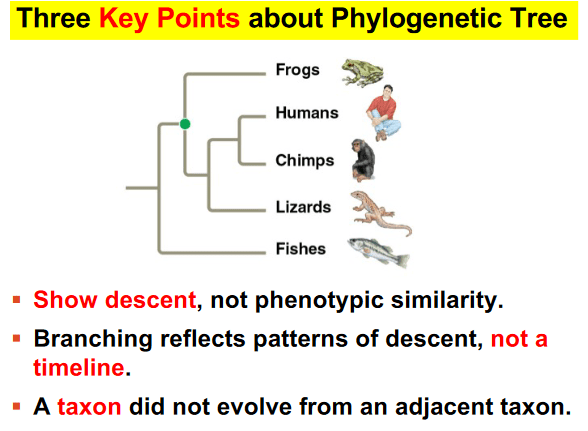
An organism's fitness is measured by
a. Genetic variation of heritable traits
b. Ability to resist drastic changes in the environment
c. how long it lives a healthy life
d. contribution to the gene pool of the next generation
d. contribution to the gene pool of the next generation
The Hardy-Weinberg equation is useful in that it allows scientists to
a. predict the number of individuals that are heterozygous at a particular locus
b. measure the amount of mutations occuring in a population
c. prove that genetic drift has occured to a population
d. provide evidence that an evolutionary force is acting on a population.
d. provide evidence that an evolutionary force is acting on a population.
The Hardy-Weinberg equation describes a population that is NOT evolving. Thus, if the calculated frequencies differ from the actual frequencies of alleles/genotypes than the population is evolving.
When Arizona's Grand Canyon formed, a population of squirrels were separated and no longer able to make contact. Over time, the two new populations diverged giving rise to two new species of squirrels. This is an example of
a. Sympatric Speciation
b. Allopatric Speciation
c. Post-zygotic barrier
d. Mechanical Isolation
b. Allopatric Speciation
Mechanical Isolation: Morphological differences
can prevent successful completion of mating (Pre-zygotic barrier)
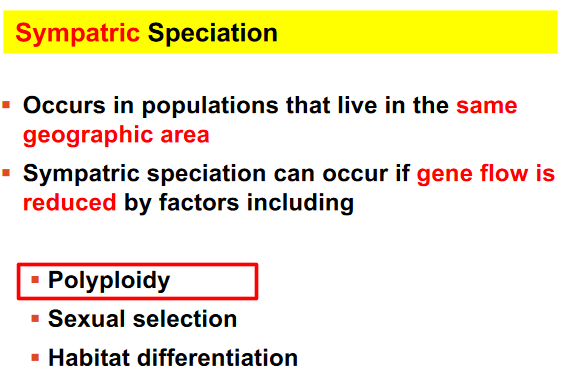
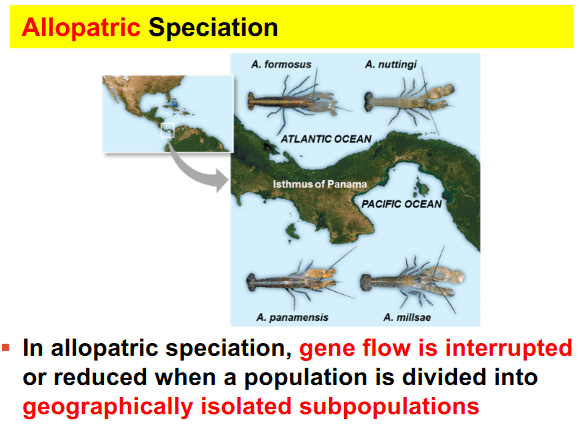
The first living organisms were
a. Multicellular eukaryotes
b. Single-celled eukaryotes
c. Multicellular prokaryotes
d. Single-celled prokaryotes
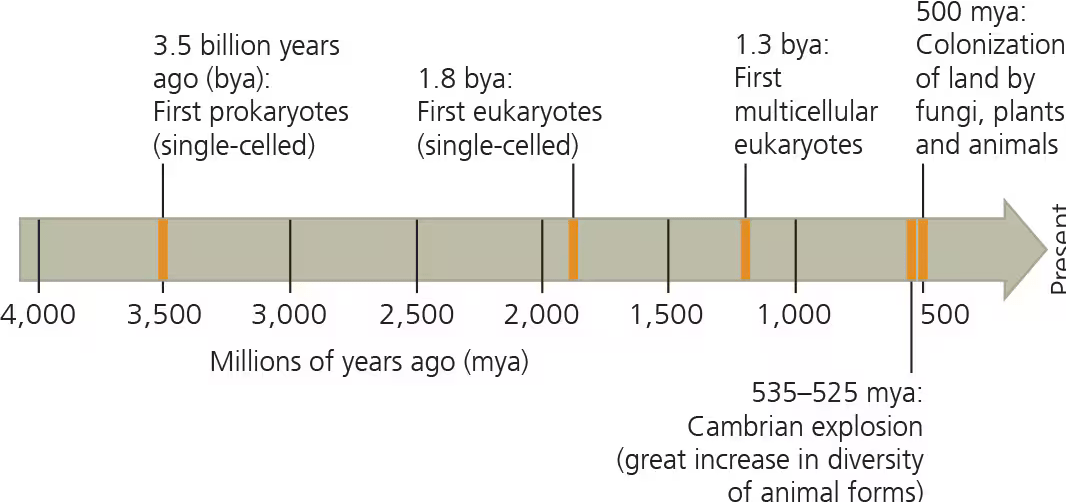
Scientists are able to classify distantly related organisms on the same phylogenetic tree by studying which genes?
a. Highly conserved homolgous genes
b. Poorly conserved homologous genes
c. Mitochondrial genes
d. Plastid genes
a. Highly conserved homolgous genes
In order to classify DISTANTLY (far apart) related organisms we need to find similar sequence genes that are shared between the organisms (homolgous). The sequence of highly conserved genes will remain relatively stable over long periods of time.
Plastid and mitochondrial DNA both evolve rapidly.
Which of the following is true regarding genetic variation?
a. Natural selection creates genetic variation
b. In response to changes in the environment, genetic variation increases
c. Sexual reproduction tends to decrease genetic variation due to organisms producing haploid cells.
d. For a population to evolve by natural selection, genetic variation must already be present.
d. For a population to evolve by natural selection, genetic variation must already be present.
Comparisons of Galapagos Finch DNA and South American bird DNA shows high base similarity. Which process of population genetic could generate these results?
a. Adaptive Radiation
b. Genetic Drift
c. Gene Flow
d. Natural Selection
C. Gene Flow
Gene flow is the movement of alleles among populations.
Alleles can be transferred through the movement of fertile individuals or gametes (for example pollen).
Two different species of lemurs mate and successfully produce a zygote. However, the embryo dies shortly after fertilization occurs. Which reproductive barrier keeps the species separated?
a. Reduced hybrid viability
b. Reduced hybrid fertility
c. Hybrid breakdown
d. Gametic Isolation
a. Reduced hybrid viability

Reduced hybrid viability: (Post-zygotic)
Genes of the different parent species may interact and impair the hybrid’s development or survival in its environment
Reduced hybrid fertility: (Post-zygotic)
Even if hybrids are vigorous, they may be sterile.
Hybrid breakdown: (Post-zygotic)
Some first-generation hybrids are fertile, but when they mate with each other or with either parent species, offspring of the next generation are sterile.
Gametic Isolation (Pre-zygotic)
Sperm of one species may not be able to fertilize eggs of another species
Which of the following statements provides the best evidence that the fossil record is an incomplete record of evolution?
a. The fossil record shows changes in kinds of organisms that lived on earth.
b. The fossil record shows that many animals are extinct.
c. The fossil record is biased for organisms that had hard shells and skeletons.
d. Fossils document how new organisms come from preexisting organisms.
c. The fossil record is biased for organisms that had hard shells and skeletons.
Molecular data places the brown bear in the bear family but places the black bear in the raccoon family. Assume the molecular data gives the correct evolutionary history of the brown and black bear. Which process could explain similarities in structure between the brown and black bear?
a. Homology
b. Divergent Evolution
c. Adaptive Radiation
d. Convergent Evolution
D. Convergent Evolution
The structural similarity between black and brown bears is an example of analogy, which results from convergent evolution.
Analogy: Similarity between two species that is due to convergent evolution rather than to descent from a common ancestor.
Convergent evolution occurs when similar environmental pressures and natural selection produce similar (analogous) adaptations in organisms from different evolutionary lineages.
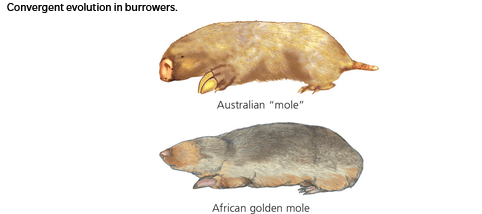
Under the influence of natural selection, what is the correct order of events?
1: Well-adapted individuals leave more offspring than do poorly adapted individuals.
2: A change occurs in the environment.
3: Genetic frequencies within the population change.
4: Poorly adapted individuals have decreased survivorship.
2 → 4 → 1 → 3
In a Hardy-Weinberg population with two alleles, A and a, that are in equilibrium, the frequency of the allele a is 0.3. What is the frequency of individuals that are heterozygous at this locus?
a. .21
b. .09
c. .49
d. .42
q= .3
p+q=1
p=1-q
p= .7
Heterozygous= 2pq
= .42
Strains of cultivated rice have accumulated different mutant recessive alleles at two loci in the course of their divergence from a common ancestor. Hybrids between them are vigorous and fertile, but plants in the next generation that carry too many of these recessive alleles are small and sterile. This is an example of
Hybrid breakdown
Some first-generation hybrids are viable and fertile, but when they mate with one another or with either parent species, offspring of the next generation are feeble or sterile.
Which of the following statements is true regarding the Permian Mass Extinction? Select ALL that apply
a. Occurred during extreme episode of volcanism
b. CO2 drastically increased in the atmosphere
c. The global temperature cooled significantly
d. Ocean acidifcation
a. Occurred during extreme episode of volcanism
b. CO2 drastically increased in the atmosphere
d. Ocean acidifcation

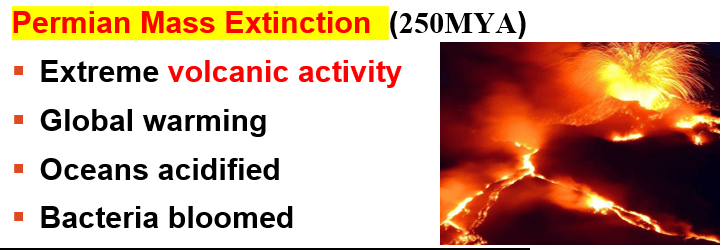
The green shaded region is an example of which type of group?
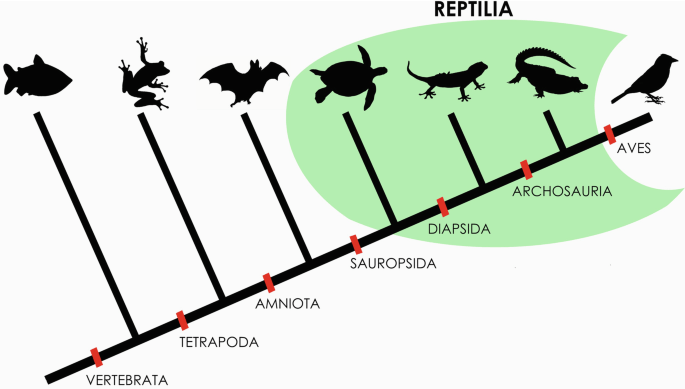
Paraphyletic Group: consists of a common ancestor and some, but NOT all, of its descendants.
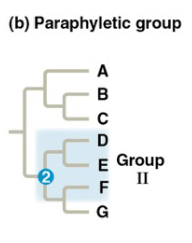
Monophyletic group (Clade): consists of a common ancestor and ALL of its descendants.
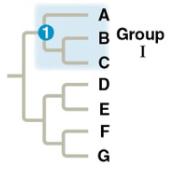
Polyphyletic: Consists of distantly related organisms but does NOT include their most recent common ancestor.
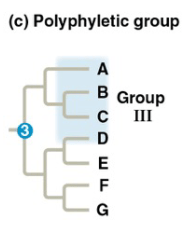
After exposing a population of bacteria to penicillin (an antibiotic), within six months the bacteria are resistant to penicillin. Explain how the bacteria evolved.
Some drug-resistant bacteria were present at the start of treatment, and natural selection increased their frequency.
Reminder about natural selection/ evolution:
- NS does NOT create individuals with favorable traits. Rather, NS favors individuals that were ALREADY present.
Harmful mutations occur in both diploid and haploid organisms. Would we expect to find more harmful mutations in diploid or haploid organisms? Explain Why
There are more harmful mutations in populations of diploids than in populations of haploids, because the mutations are protected from selection in diploid heterozygotes.
Plant species A has a diploid count of 6. Plant species B has a 2n=4. A and B plant to give rise to a new species, C, via an allopolyploid event. The diploid number for species C would be?
10
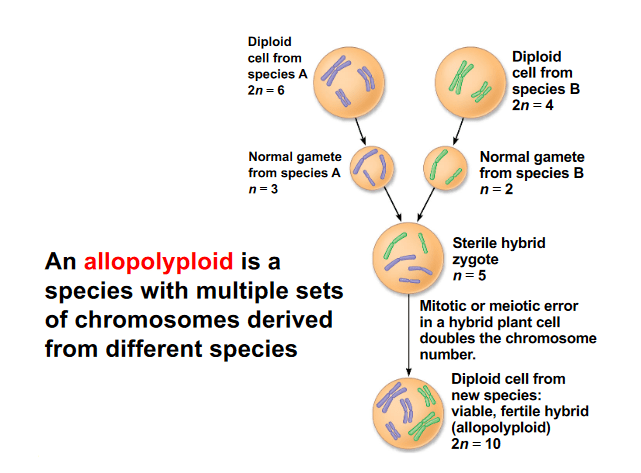
Explain the origin of the mitochondria
1. Ancestral prokaryote's plasma membrane began to fold inwards producing a nucleus and ER region.
2. This prokaryote then engulfed an aerobic bacteria (able to use O2 for metabolism)
3. Over time, a mutually beneficial relationship developed between the two cells (endosymbiosis)
4. The endosymbiote bacteria has evolved to become the mitochondria.
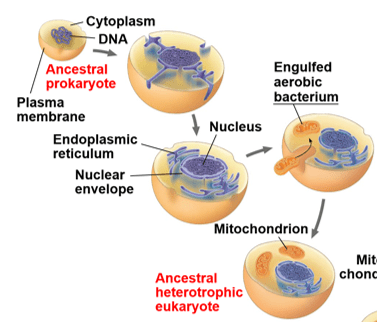
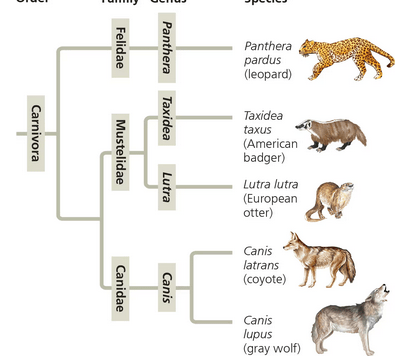
Based on the above phylogenetic tree, which animals are most closely related?
a. Leopard and American Badger
b. American Badger and Coyote
c. Otter and Leopard
d. Gray Wolf and Leopard
b. American Badger and Coyote
Rules for reading phylogenetic trees
1. Read Backwards
2. Find most recent common ancestor
3. Do not count nodes
4. Just because they are adjacent does NOT always mean they are the closet related.